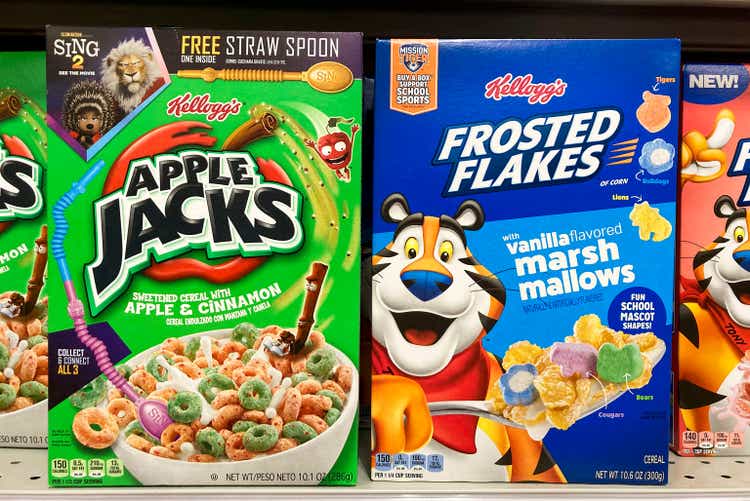Bill Pugliano/Getty Images News
By Breakingviews
Kellogg (K) is joining the corporate vogue for splitting itself in three. The $24 billion maker of Frosties and Fruit Loops on Tuesday announced it was following General Electric (GE) and Toshiba (OTCPK:TOSBF) (OTCPK:TOSYY) with plans to spin off two separate businesses. The breakup might boost the valuation eventually, but the unknowns explain the market’s frosty reception.
Chief Executive Steve Cahillane is separating the wheat from the proverbial chaff. His bet is that Kellogg’s faster-growing and higher-margin biscuits and snacks, combined with international cereals, will enjoy a more wholesome valuation when separated from the North American cereals business and Kellogg’s plant-based food unit.
The logic is that the businesses will find it easier to focus on their different trajectories and objectives as independent companies. For the producer of global snacks like Cheez-It and Pringles, building up scale in emerging markets is top of the to-do list. Meanwhile, in North America, the priority is to revive sales of Raisin Bran and Special K after recent supply chain disruptions while perhaps boosting margins. The plant-based business, which owns the MorningStar Farms brand, may become an acquisition target.
The financial rationale for the carve-up looks underwhelming, though. Assume the global snacks business, which generated almost $2 billion of EBITDA last year, is valued at the same 16 times multiple as rival Mondelez International (MDLZ). Its enterprise value would be $32 billion. The North American unit, valued at 11 times EBITDA like U.S. rival Post Holdings, would be worth about $3 billion. Meanwhile, the profitable plant-based business deserves the same 4 times multiple of revenue as loss-making rival Beyond Meat (BYND), implying a value of more than $1 billion.
Add the three together and the implied total enterprise value is $36 billion, 20% above what it was before the announcement. But that uplift doesn’t take into account the transaction costs, market risk and additional overheads involved in turning one company into three. Given the many unanswered questions about the financial structure, it’s little wonder that Kellogg’s shares rose less than 4% on Tuesday.
Breakups of consumer companies make more sense for groups like Unilever (UL), which straddles toiletries and food. Besides, global inflation, higher borrowing costs and the threat of recession already mean producers of consumer goods already have their hands full. It’s a risky time to follow corporate fashion.
Editor’s Note: The summary bullets for this article were chosen by Seeking Alpha editors.


Be the first to comment